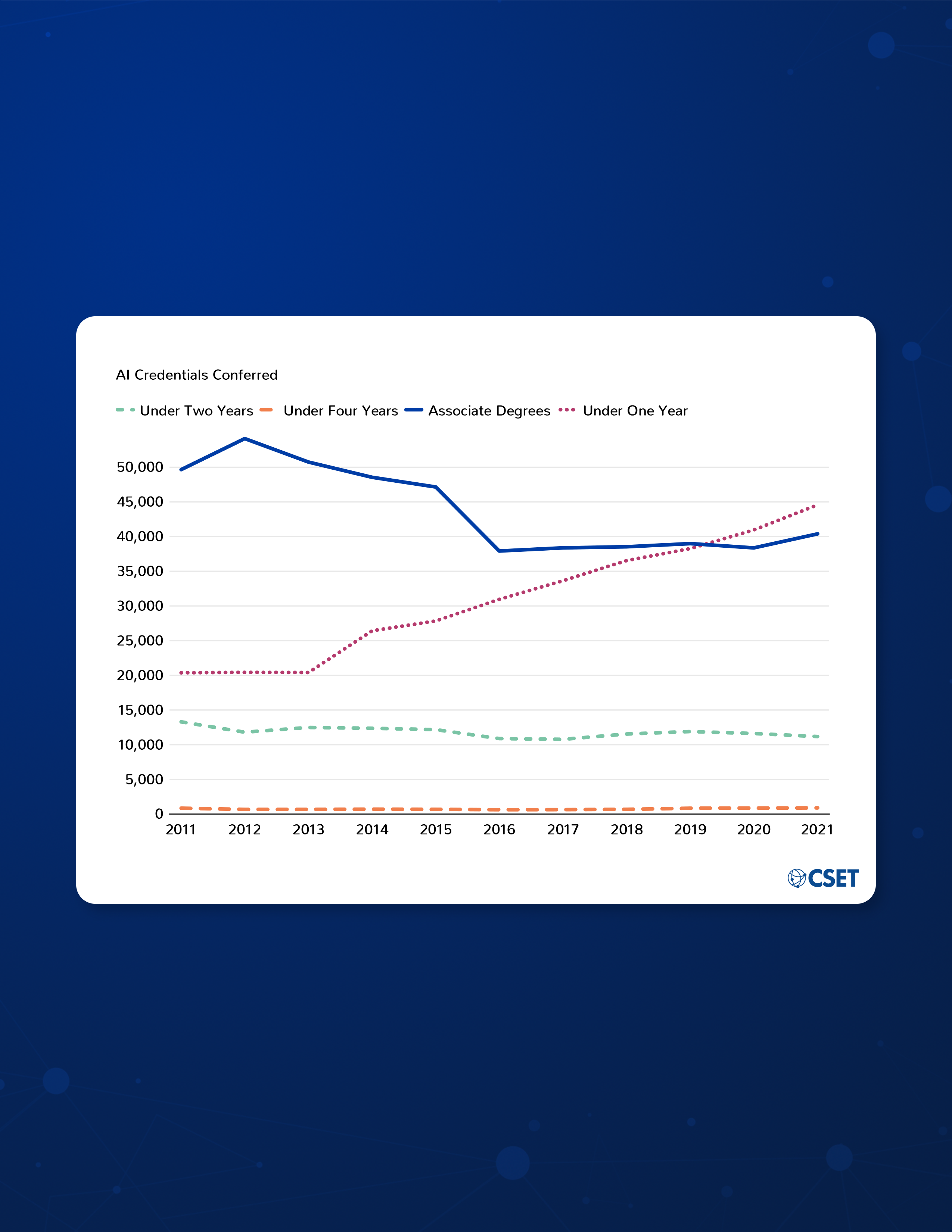The first snapshot in this series focused on graduation totals for AI-related degrees in the United States. This second snapshot highlights AI-related non-degree credentials using Integrated Postsecondary Education Data System (IPEDS) data. Following decades of degree inflation—the paradigm where employers required four-year degrees for jobs where they were unnecessary—the government and private sector have signaled a potential shift away from stringent degree requisites.1 CSET researchers have previously written about the “latent potential” of community colleges to upskill American workers and help mediate the tech talent shortage in the United States.2
Consistent with the previous snapshot focusing on postsecondary degrees, this one defines AI-related fields as majors in computer science and derivatives (e.g., “Mathematics and Computer Science”), bioinformatics, computer and electrical engineering, nanotechnology, and cybersecurity.3 Here, we examine conferral of non-degree AI-related credentials across all colleges and universities and investigate trends in over the past decade. Community and technical colleges are included in this analysis.
IPEDS differentiates non-degree awards by the length of time and education stage (e.g., pre-bachelor’s degree versus post-bachelor’s degree) of the credential. This snapshot uses the term “pre-baccalaureate” to refer to non-degree awards that aren’t specifically designated as post-baccalaureate (or post-master’s) in IPEDS and are under four years long. We also include associate degrees.
This snapshot begins with a broad overview of trends in all pre-baccalaureate awards and STEM pre-baccalaureate awards, and then compares them to temporal trends in AI-related pre-baccalaureate awards over the past decade. Additionally, we summarize the top institutions conferring AI-related pre-baccalaureate awards, designated by the number of awards granted since 2011. This analysis disaggregates pre-baccalaureate awards into four categories: under-one-year awards, under-two-year awards, associate degrees, and four-year degrees. Broadly speaking, the four categories can be described as follows:
- Under-one-year-awards include under-12-week, 12-week, and under-1-year certificates. These are often vocational and provide specialized skill training, sometimes for individuals already working in the industry.
- Under-two-year-awards are more comprehensive sources of education and training, and may include general education courses as well. Under-two-year programs prepare students for mid-level jobs in specific fields.
- Associate degrees provide a mixture of specific and general coursework.
- Under-four-year-awards are trade-specific and are frequently provided by colleges and universities. For example, some IT professionals’ training includes under-four-year-award programs.
Figure 1. Trends in Pre-Baccalaureate Awards in All Fields
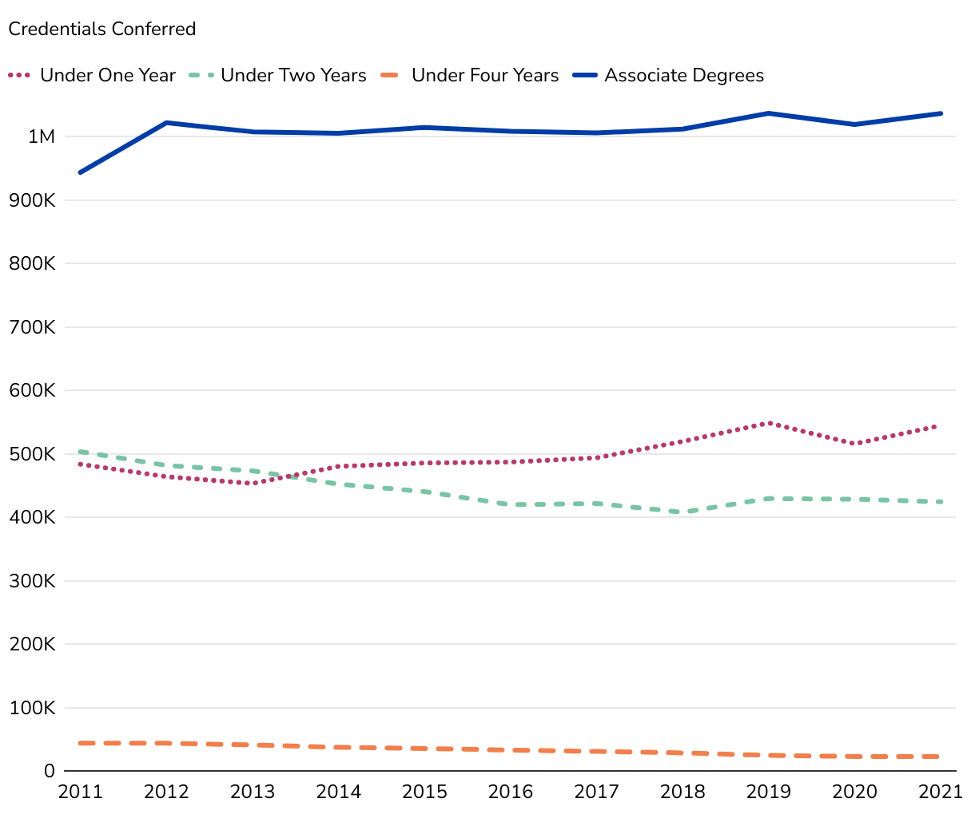
Trends for each category of interest have varied over the past decade, with under-one-year credentials and associate degrees slightly increasing at the same time as under-two and under-four-year credentials have decreased. Annual conferrals of under one-year credentials have increased 13 percent from 2011 to 2021. Associate degree conferrals have increased 10 percent during the same period. In contrast, annual conferrals of under-two-year credentials decreased 16 percent between 2011 and 2021. Under-four-year credentials decreased the most dramatically of the categories we examined; they dropped by nearly half between 2011 and 2021.
As visualized in Figure 2 below, there were almost identical trends for STEM pre-baccalaureate awards as for all-subject pre-baccalaureate awards, except that annual conferrals of STEM under-one-year credentials have more than doubled since 2011.4 Otherwise, STEM under-two-year awards and STEM under-four-year awards have both decreased about 20 percent and 25 percent, respectively, since 2011. Annual STEM Associate’s degree conferrals increased 12 percent since 2011.
Figure 2. Trends in Pre-Baccalaureate Awards in STEM Fields
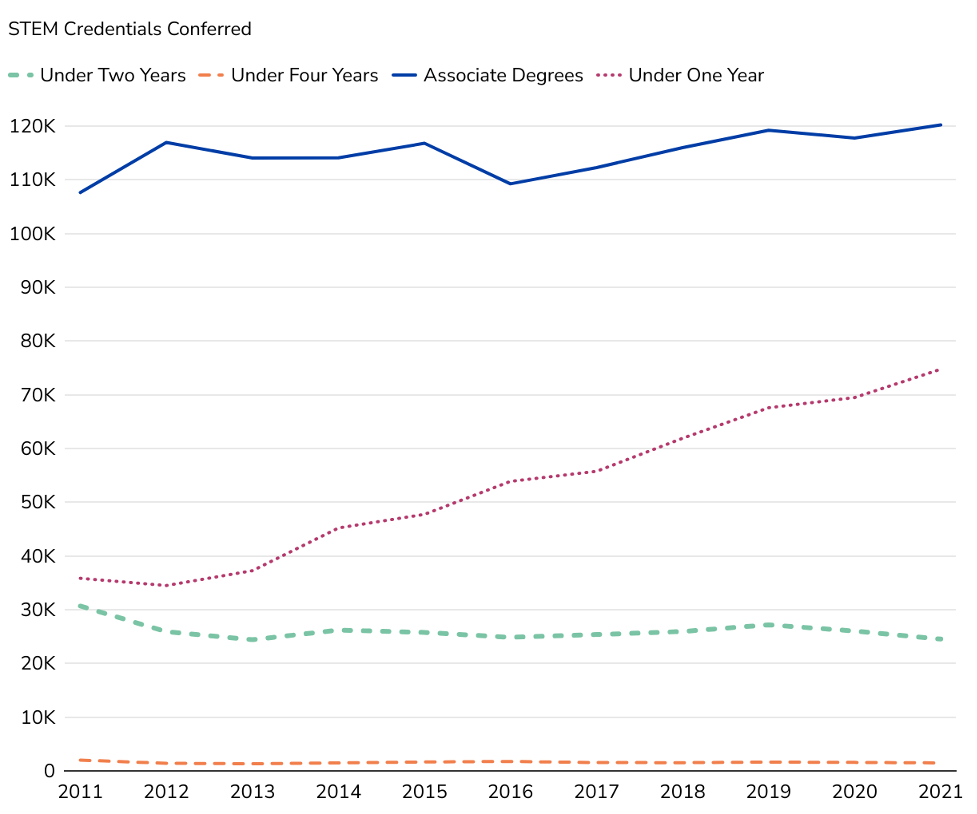
As shown in Figure 3 below, there were different trends over time depending on the type of AI-related award conferred, with upward trends in under-one-year awards and under-four-year awards in AI-related fields and downward trends in associate degree and under-two-year credential conferrals.
Specifically, AI-related associate degree and under-two-year credential conferrals have decreased over the past decade by 19 and 16 percent, respectively. Under-one-year credentials more than doubled (increasing by 118 percent between 2011 and 2021), while under-four-year credential conferalls increased modestly by 5 percent during the same period.
Figure 3. Trends in Pre-Baccalaureate Awards in AI-Related Fields
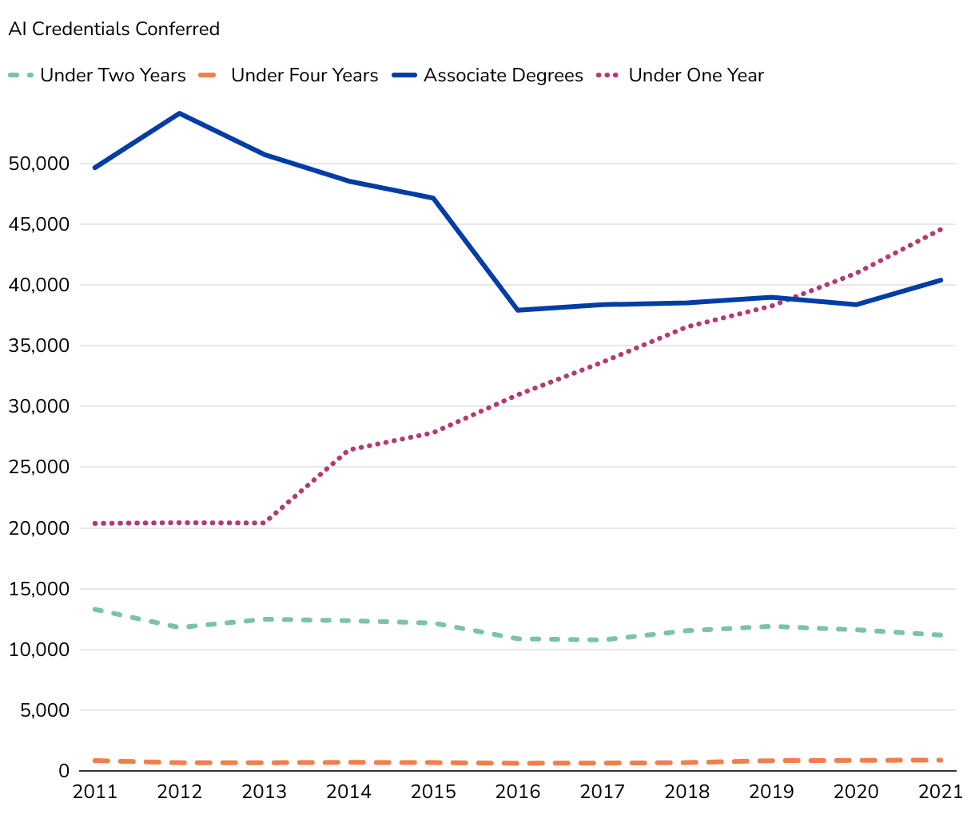
Associate degrees’ moderate decline over the past decade may be due to students who would have pursued AI-related associate degrees shifting toward bachelor’s degrees, which showed growth over the past decade, or toward shorter, non-degree credentials (or no credentials at all) such as the under-one-year certificates. It is also possible that students interested in shorter education training programs like associate degrees have shifted toward non-traditional educational providers such as non-university bootcamps (e.g., General Assembly),5 which aren’t contained in IPEDS. However, more research would be required to support these theories.
AI-related awards show higher growth than pre-baccalaureate awards across all fields: there was approximately 2 percent growth in total pre-baccalaureate awards between 2011 and 2021, while AI-related pre-baccalaureate awards grew nearly 15 percent over the same period. STEM pre-baccalaureate awards showed the most growth, with conferral increasing by 25 percent between 2011 and 2021. These findings suggest that students who don’t complete a full college degree and instead (or additionally) opt for pre-baccalaureate credentials are increasingly pursuing non-degree credentials in STEM or AI-related fields over non-STEM and non-AI-related fields. The increase in and STEM- and AI-related pre-baccalaureate awards might also be attributed to students who already pursued bachelor’s degrees, potentially in another field, and then returned to school to obtain STEM and AI-related credentials.
AI-related awards show higher growth than pre-baccalaureate awards across all fields
CSET researchers previously illustrated the crucial roles of community colleges and non-degree certification programs in providing AI education, especially to diverse populations, in the face of national tech-readiness problems.6 The findings in this snapshot buttress those results and show that some colleges and universities also comprise the top conferrers of AI-related degrees, including online-accessible or primarily virtual institutions such as the University of Phoenix, ECPI University in Virginia, and DeVry University in Illinois.
Table 1. Top Post-Secondary Institutions Conferring AI-Related Pre-Baccalaureate Credentials
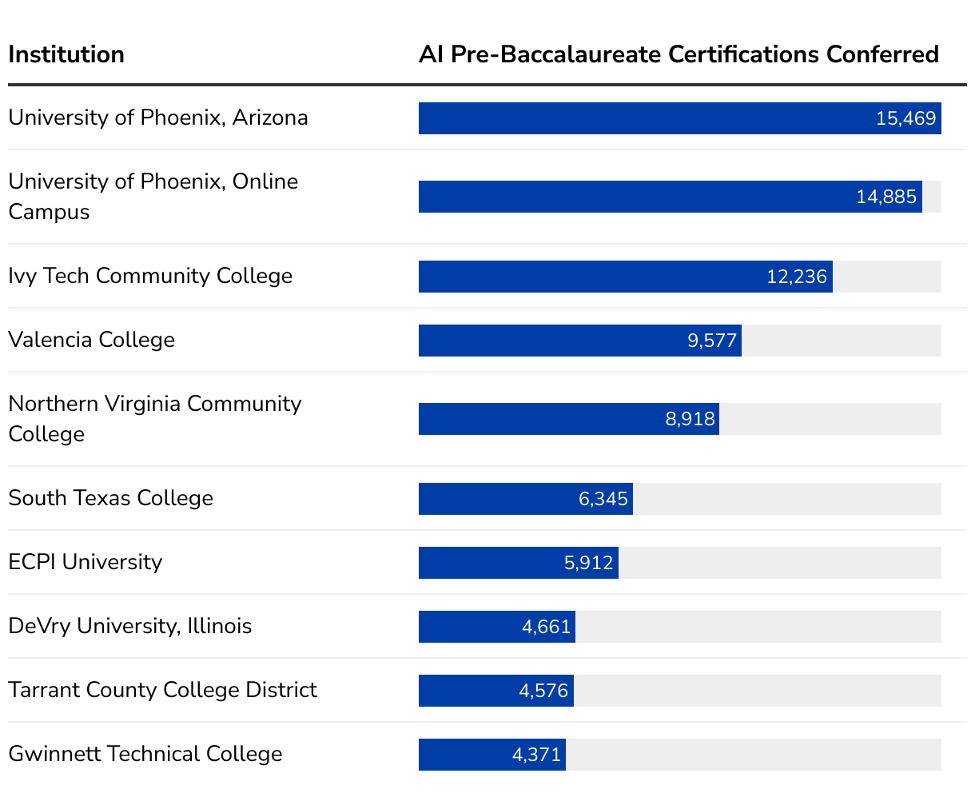
In conclusion, while overall most pre-baccalaureate award type conferrals have seen slow growth over the past decade, AI and STEM-related pre-baccalaureate award conferrals are growing much more rapidly. AI-related pre-baccalaureate award conferrals for under-four-year awards and under-one-year awards are increasing more than both general and STEM pre-baccalaureate awards, though STEM pre-baccalaureate awards are growing the most of the three buckets overall.
This disparity in student educational demand may be due to the higher supply of STEM and AI-related jobs and the need to upskill or re-skill for a technologically oriented workscape. The next snapshot in CSET’s education series will examine gender disparities in AI higher education.
- See this report on degree inflation in the U.S. from Harvard: https://www.pw.hks.harvard.edu/post/dismissed-by-degrees, and these reports on new hiring without 4-year degree requirements: https://www.pewtrusts.org/en/research-and-analysis/blogs/stateline/2022/06/23/this-state-will-hire-you-no-college-degree-required and https://hechingerreport.org/the-new-labor-market-no-bachelors-required/
- https://cset.georgetown.edu/publication/training-tomorrows-ai-workforce/
- As in Snapshot 1, we used CIP codes to filter our analysis. CIP codes are codes designating fields of study in post-secondary education. See their site for more details here: https://nces.ed.gov/ipeds/cipcode/Default.aspx?y=56
- We use STEM degree classifications from the Department of Homeland Security. See https://www.ice.gov/doclib/sevis/pdf/stemList2022.pdf for the current list of qualifying majors.
- General Assembly is a company providing technology bootcamps, training, and other services for young professionals and professionals aiming to transition to tech-oriented careers.
- https://cset.georgetown.edu/publication/training-tomorrows-ai-workforce/
